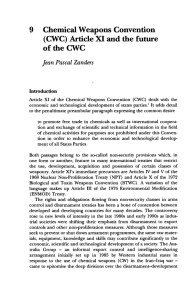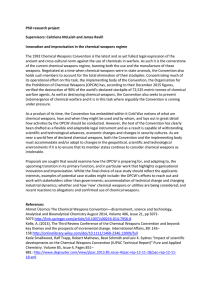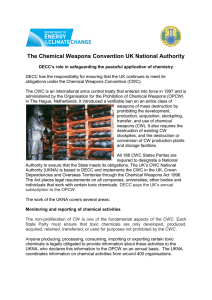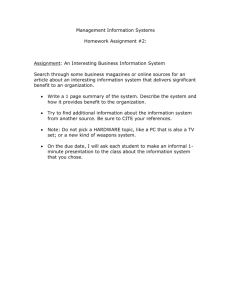In the Shadow of Syria: Review of the Chemical Weapons Convention
advertisement
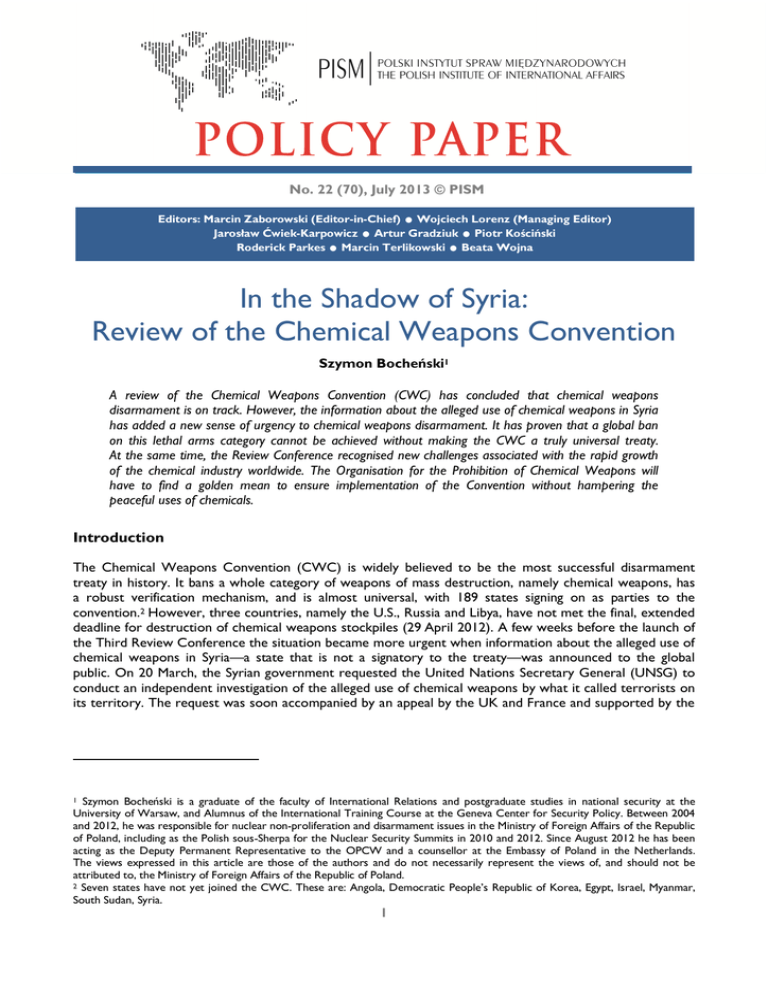
No. 22 (70), July 2013 © PISM . . . . . Editors: Marcin Zaborowski (Editor-in-Chief) Wojciech Lorenz (Managing Editor) Jarosław Ćwiek-Karpowicz Artur Gradziuk Piotr Kościński Roderick Parkes Marcin Terlikowski Beata Wojna In the Shadow of Syria: Review of the Chemical Weapons Convention Szymon Bocheński1 A review of the Chemical Weapons Convention (CWC) has concluded that chemical weapons disarmament is on track. However, the information about the alleged use of chemical weapons in Syria has added a new sense of urgency to chemical weapons disarmament. It has proven that a global ban on this lethal arms category cannot be achieved without making the CWC a truly universal treaty. At the same time, the Review Conference recognised new challenges associated with the rapid growth of the chemical industry worldwide. The Organisation for the Prohibition of Chemical Weapons will have to find a golden mean to ensure implementation of the Convention without hampering the peaceful uses of chemicals. Introduction The Chemical Weapons Convention (CWC) is widely believed to be the most successful disarmament treaty in history. It bans a whole category of weapons of mass destruction, namely chemical weapons, has a robust verification mechanism, and is almost universal, with 189 states signing on as parties to the convention.2 However, three countries, namely the U.S., Russia and Libya, have not met the final, extended deadline for destruction of chemical weapons stockpiles (29 April 2012). A few weeks before the launch of the Third Review Conference the situation became more urgent when information about the alleged use of chemical weapons in Syria—a state that is not a signatory to the treaty—was announced to the global public. On 20 March, the Syrian government requested the United Nations Secretary General (UNSG) to conduct an independent investigation of the alleged use of chemical weapons by what it called terrorists on its territory. The request was soon accompanied by an appeal by the UK and France and supported by the Szymon Bocheński is a graduate of the faculty of International Relations and postgraduate studies in national security at the University of Warsaw, and Alumnus of the International Training Course at the Geneva Center for Security Policy. Between 2004 and 2012, he was responsible for nuclear non-proliferation and disarmament issues in the Ministry of Foreign Affairs of the Republic of Poland, including as the Polish sous-Sherpa for the Nuclear Security Summits in 2010 and 2012. Since August 2012 he has been acting as the Deputy Permanent Representative to the OPCW and a counsellor at the Embassy of Poland in the Netherlands. The views expressed in this article are those of the authors and do not necessarily represent the views of, and should not be attributed to, the Ministry of Foreign Affairs of the Republic of Poland. 2 Seven states have not yet joined the CWC. These are: Angola, Democratic People’s Republic of Korea, Egypt, Israel, Myanmar, South Sudan, Syria. 1 1 EU to examine other cases in which chemical weapons might have been involved.3 The UNSG immediately began preparations to dispatch a mission, but differences regarding its terms of reference as well as the inability to guarantee the security of its personnel prevented the team from travelling to Syria. The UN fact-finding mission headed by Swedish scientist Dr. Ake Sellstrom, composed of OPCW and World Health Organisation experts, has been conducting activities outside Syrian territory. The investigation so far has been based on information and material that have been made available by various states.4 The situation regarding Syria had political ramifications for the CWC Review Conference. Secretary General Ban Ki-Moon decided to address the Conference in person and travelled to The Hague, where the headquarters of the Organisation for the Prohibition of Chemical Weapons (OPCW) are located. The statement by the UNSG made clear that the case of chemical weapons in Syria will be one of the most important political themes for the Conference, which easily could have overshadowed its main purpose— to conduct a review of the operation of the CWC since 2008 and provide guidance for the OPCW for the next five years. Key Substantial Issues for the Review Conference The main purpose of the conference was to review the progress in the destruction of chemical weapons, which is the most important pillar of the CWC regime. The meeting was also expected to discuss issues of international cooperation in peaceful uses of chemicals, national implementation of the CWC, and the effectiveness of the verification regime. There was also a debate about the future priorities of the organisation connected with a need for its adaptation to a new situation in which the parties to the Convention will have eliminated all of their chemical weapons stockpiles (the so called post-destruction phase). Destruction of Chemical Weapons The ban on chemical weapons enshrined in the text of the CWC (the Convention entered into force in 1997) obliged states with such weapons to destroy them within the specified time of 10 years with a possible extension of another five years. This timeline has proved insufficient for Russia and the United States, as well as for Libya, which joined the OPCW only in 2004, and in 2011 made new discoveries of chemical weapons after the fall of the Qaddafi regime. The late accession of Libya to the CWC regime was an effect of a shift in the foreign policy of President Qaddafi, who decided to forego his country’s WMD programmes in order to improve Libya’s standing with Western nations engaged in a war against terrorism. Russia, the U.S. and Libya missed the final extended deadline of 29 April 2012 and still have to destroy the remaining 20% of their Category 1 chemical weapons stockpiles, which includes the most dangerous gases such as VX and sarin. Missing the deadline could have been damaging for the CWC, therefore to avoid lastminute negotiations, in 2011 the Conference of States Parties adopted a decision that obliged possessor states to regularly report on the progress of destruction and Technical Secretariat to verify these activities. It also contained the requirement that the Review Conference shall examine implementation of the decision and the progress towards elimination of chemical weapons. The decision was not adopted by consensus, which was contrary to the tradition of decision-making at the OPCW. A vote against was registered by Iran, which was also expected to be among the most active states during the Review Conference interested in reopening the question of missed deadlines. With the inflexibility of the United States and Russia to renegotiate the 2011 agreement, the issue was likely to become one of the most profound stumbling blocks. The Conference conducted a review of the progress of the chemical weapons’ destruction. Following the report by the Director-General of the OPCW, countries expressed their concern that the chemical “U.N. launches probe of possible Syrian chemical arms attack,” Reuters, 21 March 2013, www.reuters.com/article/2013/03/21/ussyria-crisis-chemical-un-idUSBRE92K0OY20130321. 4 “Syria urged to grant access for UN chemical weapons probe,” Xinhua Agency, 14 June 2013, http://news.xinhuanet.com/ english/world/2013-06/15/c_132456382.htm. 3 2 weapons’ destruction deadline has not been met by Russia, the U.S. and Libya. The issue was also highlighted by the UNSG, who said that as long as chemical weapons existed, so, too, did the risk of their use—whether by accident or design.5 He also expressed his hope that the destruction of remaining stockpiles will be achieved by the next Review Conference in 2018. That expectation is contrary to the planned competition dates set by the largest possessor states. The U.S. projects that the elimination will be concluded in 2023, while the Russian deadline is 2015.6 There were unvoiced concerns whether Russia will meet its ambitious deadline of 2015. Some experts suggested prior to the Conference that problems with construction of the last chemical weapons destruction facility at Udmurtian make it unrealistic and may force Russia to delay complete elimination until 2020. To partly address these doubts, the Conference noted that possessor states have taken all necessary measures to meet the final extended deadlines. International Cooperation Support for the CWC from countries that did not possess chemical weapons was won due to a promise that the OPCW will facilitate the fullest possible exchange of chemicals, equipment and scientific and technical information relating to the development and application of chemicals for peaceful purposes. That is why for many developing states the issue of international cooperation was one of the core themes of the Review Conference. The Non Aligned States are unsatisfied with the slow progress in fostering cooperation in the field of peaceful uses of chemicals. Therefore, they insisted on the elaboration of an action plan in that area. The plan contained a number of calls for unrestricted transfers of chemicals and technologies used for the peaceful uses of chemicals and more support from the OPCW to promote international cooperation. It did not say where the financial resources to complete these steps should come from. The main weakness of the plan was that, if implemented, it would disrupt the sensitive balance between four key areas of CWC (disarmament, non re-emergence of chemical weapons, assistance and protection against use of chemical weapons and international cooperation) to the advantage of the international cooperation. This was not acceptable for the Western countries. Therefore, in the final document of the Conference, the countries obliged themselves to identify avenues for further work that would advance the objective of international cooperation. This can be treated as a substitute of an action plan. They also managed to include references to the role of industry and civil society in advancing the goals of Article XI. This issue is of particular relevance. With the rapid growth of the chemical industry worldwide, no one can expect that OPCW will be capable of making a difference alone in fostering international cooperation. Technologies and training capacities are owned by industry, academia and scientific organisations, which should be more involved into advancing the goals of the CWC. National Implementation of the CWC Out of the 189 states that ratified the Convention, about 100 have not established national authorities, which play an important role in the transposition of the CWC provisions into national legislation. Most of these countries are African and they mostly do not yet have a chemical industry. However, with the spectacular economic growth and global spread of technology, lagging in national implementation may at some point prove to be problematic due to the dual-use nature of some chemicals. Even if they are not produced in a certain state, the might be transferred across its territory. That is why, in particular for Western states, the prevention of the re-emergence of chemical weapons and more universal national implementation became so important. The validity of the verification measures of the CWC relies on the same principle. The effective verification mechanism, which is based on a system of on-site inspections at chemical facilities, makes the OPCW relevant. It builds the confidence that no country conducts prohibited activities that could result in the reemergence of chemical weapons. The importance of the verification mechanism will grow gradually as the Remarks to the Third Review Conference of the States Parties to the Chemical Weapons Convention, www.un.org/apps/news/ infocus/sgspeeches/statments_full.asp?statID=1818. 6 “Russia may delay chemical weapons disposal until 2020,” RIA Novosti, 5 April 2013, http://en.rian.ru/russia/20130405/ 180455026.html. 5 3 destruction activities diminish. That is why in the so called post-destruction phase the OPCW should seek to increase the number and scope of the industry inspections. There will be a need for new verification technologies and an increased number of inspections (and inspectors). The Review Conference concluded that the current mechanism meets the requirements of the Convention, but at the same time it should be improved in response to advances in science and technology. Incapacitating Chemical Agents The Third Review Conference dealt also with the topic of so called incapacitating chemical agents. These are toxic chemicals considered also to be non-lethal agents. They can produce temporary disabling conditions that can be physical or mental and persist for hours or days after exposure to the agent has ceased.7 In higher concentrations, such agents might be dangerous to health or even cause a death due to an overdose.8 The CWC does not require the states to declare toxic chemicals they might hold for law enforcement purposes (other than riot-control agents, which should be declared). This is considered by the International Committee of the Red Cross to be a gap in the Convention that may allow for the development of toxic chemicals for law enforcement purposes that might later be employed in a conflict. A further consequence of such a situation would be the irrelevance of the CWC and the OPCW. Unfortunately, the Conference failed to reach an agreement that would allow for a discussion and exchange of information on incapacitating chemical agents, as some parties to the CWC were not ready to accept it. However, the debate on the issue raised awareness of the problem and helped to initiate voluntary cooperation between like-minded countries, which hopefully will bear fruits before the next Review Conference. Polish Priorities Poland is one of the founding nations of the Chemical Weapons Convention. Since the OPCW’s creation in 1997 and entry into force, Poland has been taking an active part in advancing the goal of chemical weapons disarmament. Maintaining a strong presence at the OPCW forum is also necessary to safeguarding Polish interests, which stem from the fact that Poland has a significant chemical industry. The industrial and scientific base connected with experience collected over many years create favourable conditions for strengthening cooperation with the OPCW and engagement in international cooperation with interested countries. Polish specialties are assistance and protection against use of toxic chemicals and chemical safety and security. At the 2013 Conference, Polish priorities were associated with a strong conviction that the meeting should be instrumental in paving the way for the OPCW’s transformation. The organisation should start to evolve from a purely disarmament institution to focus on the reduction of the chemical threat. An important element of this transition is the introduction of the notion of chemical safety and security into the work of the organisation and its promotion. Poland was one of the first states to establish on its territory an International Centre for Chemical Safety and Security, located in Tarnów. The centre promotes cooperation in this field, acting together with other international partners representing the chemical industry and academia. The subject of chemical safety and security has also been introduced into the work of the G8 Global Partnership against the spread of weapons of mass destruction, where a working group on this subject has been created (co-chaired by Poland and Ukraine). In addition to these areas, Poland, together with Lithuania, has been actively pushing for inclusion in the OPCW context the subject of sea-dumped chemical weapons. The theme has been pursued so far only at the UN thanks to a Lithuanian-sponsored resolution (II Committee), which tackled the issue from a purely environmental point of view. The most relevant organisation to deal with the subject is OPCW, but many provisions of the Chemical Weapons Convention do not cover chemical weapons dumped at sea before Report from the Expert Meeting: Incapacitating Chemical Agents Implications for International Law, Montreux, Switzerland, 24–26 March 2010. Available at: www.icrc.org/eng/assets/files/publications/icrc-002-4051.pdf. 8 The best-known case where such toxic chemicals were employed was the anti-terrorist action at the Moscow Dubrovka theatre in October 2002. 7 4 1985. That is why OPCW may only be a forum for voluntary cooperation in this area, and that was the Lithuanian and Polish aim. Solution to the Syrian issue Preserving the balance of substance discussed at the meeting was one of the main challenges for the chairperson of the Conference—ambassador Krzysztof Paturej of Poland.9 However the fate of the Conference relied on the need to resolve the outstanding and political issues in reference to Syria and the investigation initiated by the UN Secretary General into the alleged use of chemical weapons in the country. Western states insisted on including strong language on Syria in both the political declaration of the Conference and its report. A point of reference was the statement by the UN Secretary General on the first day of the Conference. This proposal was not acceptable to a small group of states, which included China and Russia. Other countries underlined the fact that the OPCW is not well-suited in political terms to solve the issue of Syria, which is being debated in the UN Security Council. These voices of reason emphasized also the fact that the fate of the Review Conference cannot depend on that problem. Finally, the balance of benefits and harms favoured finding a consensual solution to the Syrian problem and to have the final document, rather than face the failure of the Conference, the side-effects of which could influence work of the OPCW. Since there was no agreement on how to handle the Syrian issue in New York, one would need to be very optimistic to count on finding a solution in the Review Conference. Paradoxically, this conviction guided countries to reach a common view that the fate of the Syrian issue should not be decided in The Hague, but in New York in the UN Security Council. Late in the evening on Friday, 19 of April, the so called Hague spirit prevailed. Interested countries agreed on one reference to Syria in the political declaration. The language points to the technical role of the OPCW in carrying out the UN investigation. There is no reference to the UN Secretary General’s statement or the scope of the fact-finding mission.10 Outcomes of the Review Conference and Way Forward The two-part final document was adopted by consensus. It consists of a political declaration that confirms the “unequivocal commitment” of the parties to the global chemical weapons ban and a comprehensive review of CWC implementation that also maps out the OPCW’s priorities for the coming five years. The political declaration contains a reference to Syria, the only consensus language reached on the issue at multilateral forums. The final document in both of its parts reflects the delicate balance between the interests of the parties. However a number of questions arise, in particular what did the outcomes of the Review Conference mean for the OPCW and the future of the chemical weapons convention regime? Did the Conference achieve its objective of providing guidance for the OPCW for the next five years? Did the review process enable reflection regarding the future roles of the OPCW? These overlapping questions touch upon the heart of the issue of the CWC’s relevance in the coming years. The OPCW must open itself to new challenges and adapt to the post-destruction phase, while not Ambassador Paturej is an experienced Polish diplomat, whose diplomatic career has been closely linked with WMD nonproliferation and disarmament issues. He was a Permanent Representative of Poland to the OPCW and also worked for the organisation itself as the director of the Office of Special Projects. In the past, he presided also over the OPCW policy-making organs, the Executive Council and Conference of States Parties. 10 “Recalling the Thirty-Second Meeting of the Executive Council, [the State Parties] reiterated their deep concern that chemical weapons may have been used in the Syrian Arab Republic and underlined that the use of chemical weapons by anyone under any circumstances would be reprehensible and completely contrary to the legal norms and standards of the international community. Recalling the expertise in the OPCW for the investigation of alleged use of chemical weapons, the States Parties expressed their support for the close cooperation, in accordance with paragraph 27 of Part XI of the Verification Annex of the Convention, between the Director-General of the OPCW and the Secretary-General of the United Nations in this regard.” Available at: www.opcw.org/fileadmin/OPCW/CSP/RC-3/en/rc303__e_.pdf. 9 5 losing its main expertise in the area of the elimination of chemical weapons. The CWC is still not universal and some countries outside of the Convention possess chemical weapons. Their adherence in the future will require the appropriate verification of destruction by the OPCW. At the same time, due to the rapid development of the chemical industry globally and increased transfers of toxic chemicals and other substances, new challenges for the OPCW are associated with the possible hostile use of toxic chemicals by non-state actors, such as terrorists. Similarly, developments in science technology and in particular, so called convergence between biology and chemicals can easily make CWC irrelevant in the future. In that context, the Review Conference provided some guidance regarding the future dimensions of the OPCW. It recognised that implementation for the Convention may need to be improved in order to meet new challenges. Therefore, the advisory body to the Director-General of the OPCW will study the implications of advances in the convergence of chemicals and biology for the Convention. In the area of chemical safety and security, states perceive the role of the OPCW as a platform of cooperation with chemical industry, academia and civil society. In order to facilitate this cooperation, the Conference welcomed the establishment by the parties to the convention of national and international centres of excellence. Resource centres can offer expertise and assistance in national capacity-building in such areas as chemical safety and security.11 Such organisations can fill the gap created by limitations of the OPCW (budgetary and legal but also political). Finally, acting upon the initiative of Poland and Lithuania, the Conference for the first time in the history of the OPCW invited the parties to explore voluntary cooperation on sea-dumped chemical weapons. The ability to use opportunities provided by the outcomes of the Review Conference will be solely dependent on the parties. The policy-making organs of the OPCW in The Hague will have to take responsibility for implementation of the final document, which provided vision for the next five years. This subject will be a main theme for the upcoming meetings of the Executive Council—an important policymaking body, which consists of 41 states. The information on the alleged use of chemical weapons in Syria almost dominated the Third Review Conference and determined the outcome. It quickly became clear that the OPCW in The Hague will not be the forum where the issue will be decided. Nevertheless, it does not mean that the Syrian problem proved the irrelevance of the organisation. Its expertise and inspectors continue to be ready to assist the UN-lead investigation. In addition, the organisation might explore other roles to play in view of the possible use of chemical weapons in Syria, in the form of assistance and protection offered to neighbouring parties to the CWC. The technical assistance can be provided notwithstanding a political impasse in New York. The case of chemical weapons in Syria has also a second meaning for the OPCW. It is a reminder that despite significant progress in the destruction of chemical weapons, these lethal weapons have not become irrelevant in certain regions, and they might be employed in some situations. The chemical weapons “taboo” is not so well rooted as jus cogens against the use of nuclear weapons. It also highlighted that achieving the goals of the CWC will require accession by countries possessing chemical weapons. Therefore, the OPCW should retain knowledge on their destruction and verification of disarmament. The competition of destruction by the biggest possessors, Russia and the United States, will not make the world free of chemical weapons. One example of such a centre is the International Center for Chemical Safety and Security established in Tarnów in Poland (www.iccss.com.pl). The centre, in cooperation with international partners, is developing its first programme for chemical safety and security activities in Kenya. 11 6
